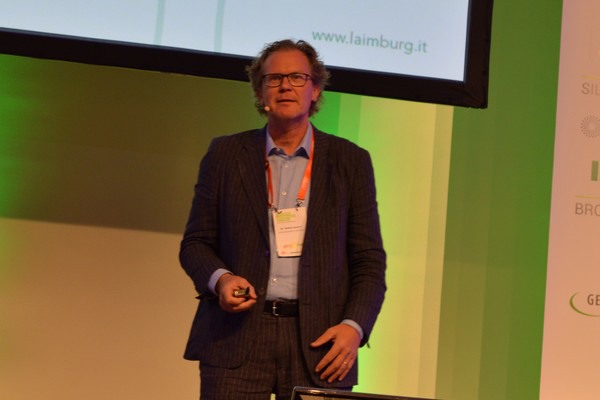Once again this year, many fruit-growing regions in Europe have suffered severe crop losses due to extreme weather conditions. The Laimburg Research Centre has set up a large-scale research project to ensure that fruit production can continue in times of climate change. The research work of the South Tyrolean institute is based on five cornerstones, including climate-neutral agriculture. In his presentation at this year's DOGK, Dr Walter Guerra provided an insight into the current topics and previous research results.
The glaciers and therefore the water reserves in the Alpine region of South Tyrol are expected to disappear by 2050, emphasised Guerra. Meanwhile, extreme weather events such as heavy rainfall and flooding are continuing to increase and with them the consequences for local fruit growing. Rising temperatures have already increased water consumption by 20 per cent. In addition, the temperature fluctuations between day and night are particularly important for the apple's growth process. However, temperatures are tending to become more even, which is why the differences are decreasing.

Dr Walter Guerra from the Laimburg Research Centre also referred to the positive effects of climate change, such as increased fruit set and larger fruit.
Fight against climate change
According to Guerra, some of the specific consequences for fruit growing are serious. "Full bloom is taking place earlier and earlier, which is best illustrated by the example of the Golden Delicious, the most widely cultivated apple in South Tyrol. As a result, fruit producers are faced with a higher risk of blossom frost. The same applies to the increased pest pressure in fruit growing, above all the marmorated stink bug, as well as new diseases such as Glomella Leaf Spot (GLS). The phenomenon of sunburn is leading to an increase in physiological disorders, and the internal and external quality of apples and their shelf life are also being increasingly affected." In close cooperation with other European research institutes, new breeding technologies are being developed in the search for resilient apple varieties. The latest research results will be presented at this year's Interpoma in Bolzano.
The South Tyrolean apple industry has already taken numerous measures in the fight against climate change, said Guerra. A good example of successful crop protection is frost protection irrigation. However, this is not possible in all areas, which is why the comparatively expensive frost candles continue to be used. Several solutions for smart irrigation of orchards are also currently being tested for their practicality. "The most important thing for growers is that we offer practical and affordable solutions. One example of this is protective nets, whereby the tried-and-tested hail nets are increasingly becoming multifunctional nets that are also used against sunshine and pests. Another example is pneumatic defoliation to improve the appearance of the fruit."
Knowledge-based variety and location selection
According to Guerra, the key to success lies above all in the knowledge-based selection of varieties and locations. The ongoing dialogue between researchers and marketers is crucial here. "It's primarily about producing the right variety in the right location. After all, you have to be able to live from the plants you plant today in 10-20 years' time," he concludes.
For more information:
Dr Walter Guerra
Phone: +39 0471 969678
E-Mail: [email protected]
www.laimburg.it
